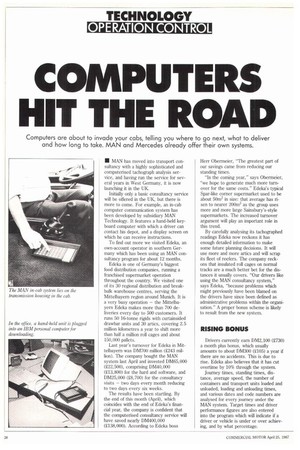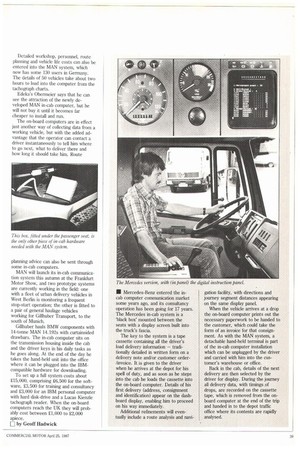COMPUTERS HIT THE ROAD
Page 40

Page 41

If you've noticed an error in this article please click here to report it so we can fix it.
Computers are about to invade your cabs, telling you where to go next, what to deliver and how long to take. MAN and Mercedes already offer their own systems.
• MAN has moved into transport consultancy with a highly sophisticated and computerised tachograph analysis service, and having run the service for several years in West Germany, it is now launching it in the UK.
Initially only a basic consultancy service will be offered in the UK, but there is more to come. For example, an in-cab computer communication system has been developed by subsidiary MAN Technology. It features a hand-held keyboard computer with which a driver can contact his depot, and a display screen on which he can receive instructions.
To find out more we visited Edeka, an own-account operator in southern Germany which has been using an MAN consultancy program for about 12 months.
Edeka is one of Germany's biggest food distribution companies, running a franchised supermarket operation throughout the country. We visited one of its 30 regional distribution and breakbulk warehouse centres, serving the Mittelbayem region around Munich. It is a very busy operation — the Mittelbayern Edeka makes more than 700 deliveries every day to 500 customers. It runs 50 16-tonne riOds with curtainsided drawbar units and 30 artics, covering 2.5 million kilometres a year to shift more than half a million roll cages and about 150,000 pallets.
Last year's turnover for Edeka in Mittelbayem was DM700 million (243 million). The company bought the MAN system last April and invested DM65,000 (22,500), comprising DM40,000 (g13,800) for the hard and software, and DM25,000 (28,700) for the consultancy visits — two days every month reducing to two days every six weeks.
The results have been startling. By the end of this month (April), which coincides with the end of Edeka's financial year, the company is confident that the computerised consultancy service will have saved nearly DM400,000 (2138,000). According to Edeka boss Herr Obermeier, The greatest part of our savings came from reducing our standing times.
In the coming year," says Oberrneier, "we hope to generate much more turnover for the same costs." Edeka's typical Spar-like corner supermarket used to be about 50m2 in size: that average has risen to nearer 200m2 as the group uses more and more large Sainsbury's-style supermarkets. The increased turnover argument will play an important role in this trend.
By carefully analysing its tachographed readings Edeka now reckons it has enough detailed information to make some future planning decisions. It will use more and more artics and will scrap its fleet of reefers. The company reckons that insulated roll cages on normal tracks are a much better bet for the distances it usually covers. "Our drivers like using the MAN consultancy system," says Edeka, "because problems which might previously have been blamed on the drivers have since been defined as administrative problems within the organisation." A proper bonus scheme is likely to result from the new system.
RISING BONUS
Drivers currently earn DM2,100 (E730) a month plus bonus, which usually amounts to about DM300 (105) a year if there are no accidents. This is due to rise. Edeka also believes that it has cut overtime by 10% through the system.
Journey times, standing times, distance, average speed, the number of containers and transport units loaded and unloaded, loading and unloading times, and various dates and code numbers are analysed for every journey under the MAN system. Target times and driver performance figures are also entered into the program which will indicate if a driver or vehicle is under or over achieving, and by what percentage. Detailed workshop, personnel, route planning and vehicle life costs can also be entered into the MAN system, which now has some 130 users in Germany. The details of 50 vehicles take about two hours to load into the computer from the tachograph charts.
Edeka's Obermeier says that he can see the attraction of the newly developed MAN in-cab computer, but he will not buy it until it becomes far cheaper to install and run.
The on-board computers are in effect just another way of collecting data from a working vehicle, but with the added advantage that the operator can contact a driver instantaneously to tell him where to go next, what to deliver there and how long it should take him. Route planning advice can also be sent through some in-cab computers.
MAN will launch its in-cab communication system this autumn at the Frankfurt Motor Show, and two prototype systems are currently working in the field: one with a fleet of urban delivery vehicles in West Berlin is monitoring a frequent stop-start operation; the other is fitted to a pair of general haulage vehicles working for Gillhuber Transport, to the south of Munich.
Gillhuber hauls BMW components with 14-tonne MAN 14.192s with curtainsided drawbars. The in-cab computer sits on the transmission housing inside the cab and the driver keys in his daily tasks as he goes along. At the end of the day he takes the hand-held unit into the office where it can be plugged into the IBMcompatible hardware for downloading.
To set up a full system costs about £15,000, comprising £6,500 for the software, 23,500 for training and consultancy and 23,000 for an IBM personal computer with hard disk-drive and a Lucas Kienzle tachograph reader. When the on-board computers reach the UK they will probably cost between 21,000 to £2,000 apiece.
LI by Geoff Hadwick
























































































































